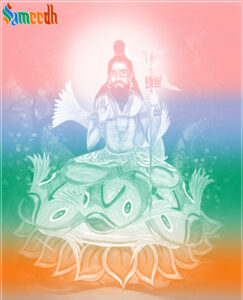Matsyendranath, also known as Matsyendranatha or Macchindranath, is a revered figure in Hinduism and is considered one of the founding fathers of Hatha Yoga and Tantra. He is believed to have lived around the 9th or 10th century CE.

Matsyendranath’s birth is shrouded in myth and legend. According to one story, he was born underwater as a fish (Matsya) and was discovered by the great Lord Shiv. Shiv then adopted him and raised him as his own child. This is how he got the name “Matsyendranath,” meaning “Lord of the Fishes.”
Matsyendranath is often depicted as a Nath yogi, associated with the Nath tradition, which is a Shaivite sect known for its emphasis on yoga and spiritual practices. Matsyendranath, as a revered sage in the Nath tradition of yoga, imparted teachings that encompassed various aspects of spiritual practice, self-realization, and liberation. While specific texts attributed to Matsyendranath are not widely available, his teachings have been passed down through oral tradition and are often integrated into the broader teachings of the Nath yogis.
Matsyendranath’s encounter with Gorakshanath, another revered saint in the Nath tradition, is a legendary tale that highlights Matsyendranath’s humility and devotion. According to the story, Matsyendranath, in the form of a fish, devoured all the smaller fish in a pond. Gorakshanath, testing Matsyendranath’s spiritual maturity, then filled the pond with milk. When Matsyendranath drank the milk, he realized his mistake and sought forgiveness from Gorakshanath, who accepted him as his disciple. This tale underscores the importance of humility and the guru-disciple relationship in spiritual practice.
Matsyendranath is regarded as one of the most important figures in the Nath tradition, along with Gorakshanath. Together, they are considered the founding fathers of the Nath lineage. The Nath tradition emphasizes the practice of yoga, meditation, and spiritual discipline as a means of attaining liberation (moksh).
Here are some key aspects of Matsyendranath’s significance:
- Hatha Yoga and Tantra: Matsyendranath is credited with the development and propagation of Hatha Yoga, a branch of yoga that focuses on physical postures (asanas), breath control (pranayam), and energy manipulation (bandhas and mudras) to awaken the Kundalini energy and achieve spiritual awakening. He is also associated with Tantra, a spiritual tradition that seeks to harness and transform the energies of the body and mind for spiritual growth.
- The Transmission of Yoga Secrets: Matsyendranath is revered as one of the primary transmitters of the ancient science of yoga. Legend has it that Matsyendranath received the secrets of yoga directly from Lord Shiv. Matsyendranath’s teachings and practices, which encompassed various forms of hatha yoga, tantra, and esoteric knowledge, continue to inspire practitioners around the world today.
- The Siddha and His Miracles: Matsyendranath is often depicted as a Siddha, a perfected being who has attained spiritual enlightenment and mastery over his body and mind. Numerous stories abound regarding Matsyendranath’s miraculous abilities, including feats of levitation, healing, and shape-shifting. These miracles serve to emphasize Matsyendranath’s divine nature and his role as a spiritual guide and protector of his devotees.
- Founding the Nath Tradition: Matsyendranath is considered the founding figure of the Nath tradition, a spiritual lineage that emphasizes the attainment of self-realization through yoga and meditation. His teachings, codified in texts such as the Matsyendra Samhita, continue to form the basis of the Nath tradition’s spiritual practices and philosophies.
- Teachings and Legacy: Matsyendranath’s teachings emphasize the importance of disciplined practice, self-awareness, and inner transformation as means of spiritual evolution. His teachings have had a profound influence on various schools of yoga, tantra, and spiritual philosophy in India and beyond. Many contemporary practitioners of yoga and tantra consider Matsyendranath as a revered sage and guide.
Overall, Matsyendranath occupies a significant place in the history of yoga, tantra, and spiritual philosophy in India. His teachings continue to inspire seekers on the path of self-discovery and spiritual realization.
